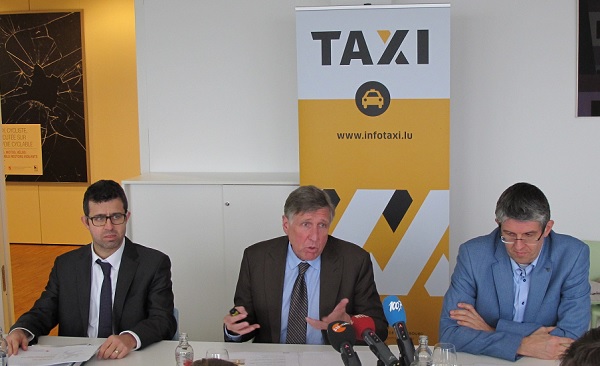 (L-R): Max Nilles; François Bausch, Minister of Sustainable Development and Infrastructure; Jean-Paul Maas;
Credit: MDDI
(L-R): Max Nilles; François Bausch, Minister of Sustainable Development and Infrastructure; Jean-Paul Maas;
Credit: MDDI
On Friday, Luxembourg's Minister of Sustainable Development and Infrastructure, François Bausch, presented an initial assessment of the state of the taxi reform after 18 months since the entry into force of the law of 5 July 2016, and presented ways of adjusting the reform package.
Minister Bausch firstly welcomed the fact that a large part of the measures introduced by this law were met with success, including removing taxis operating without licenses, the transition from a communal regime to a single point of contact as well as the introduction of zero emission taxis and the application of environmental standards for ordinary taxis.
The taxi service with its complaints centre has recorded 2,651 contacts, including 273 customer complaints, due to overcharging and inappropriate behaviour of drivers.
However, the central problem remains as the level of the availability of taxis at peak hours or in the evening. In addition, it was found that prices, despite a diversification of applied tariffs, have not seen a downward trend, despite GDP growth of 18.9% between 2013 and 2017 according to STATEC figures.
Minister Bausch detailed a series of adjustment proposals will have to be made in the interest of clients and with a view to administrative simplification for the benefit of the sector: these are to be discussed with the sector in the coming weeks:
• Option to create a national zone
• Trail to increase the supply of clean taxis
• Adapt the sector to the digital age with digital ticket receipts and taxisharing
• Strengthening user rights
• Strengthening supervisory and sanctioning powers
• A campaign to raise the customer's awareness of his/her rights
Minister Bausch concluded by stating "The taxi reform in 2016 was a necessary first step in reforming the taxi industry. I have always felt that if the reform is not conclusive and must be adjusted on one or another point. The lessons learned during the last eighteen months after the entry into force of the law of 5 July 2016 allow me to draw an objective and neutral assessment and to put forward concrete ways to change the taxi supply in the country, meaning more attractiveness and quality as desired by our citizens and professional circles."








